 Jerry
Adams is the President/CEO of the Arkansas
Research Alliance, an
economic development non-profit modeled on the very successful Georgia
Research Alliance. Its primary focus is to leverage university-based
job-creating research in Arkansas. The ARA Board of Trustees consists
of the five chancellors of the Arkansas research universities and
sixteen Arkansas based CEOs. (www.aralliance.org). Jerry retired
from Acxiom Corporation in October, 2007 after 34 years serving a
variety of senior leadership roles and started the Arkansas Research
Alliance in April 2008. Jerry served as the chair of Accelerate Arkansas,
a statewide volunteer group of leaders focused on building a knowledge-based
economy in Arkansas.
He continues to serve on Accelerate Arkansas’ executive committee. Active
in the start up community, Jerry serves on the Management Committee
of Funds for Arkansas’ Future, the state’s first angel fund.
Jerry also serves on the advisory board of the Arkansas Regional Innovation
Hub, chairs the board of BioVentures, the incubator at UAMS and serves
on the Board of VIC Technology Venture Development, a Fayetteville based
for profit incubator. Jerry is involved with education reform having
served on the Governor’s Blue Ribbon Committee for Higher Education.
He is currently serving on the Board of Visitors at the University of
Arkansas at Little Rock, past board member of the Dean’s Advisory
Board at the University of Arkansas’ Walton School of Business,
the University of Central Arkansas Advisory Board for the College of
Mathematics and Natural Sciences and the University of Central Arkansas
Regional Advisory Board for the College of Fine Arts & Communication.
Jerry was a founding member of the STEM Coalition and served as chair
of the EAST Initiative, a secondary school technology based project learning
initiative active in over 200 schools in Arkansas and six other states.
Jerry also serves board chair of the Arkansas Initiative for Math & Science
(AAIMS) focused on advanced placement of math and science in Arkansas
high schools. Jerry also serves on the Board of the Arkansas Center for
Health Improvement (ACHI). Jerry is the founding board chair for the
Conway Interfaith Clinic, a clinic focused on providing medical and dental
services to segments of the community who are underserved. Jerry was
the founding board chair for the Faulkner County Community Foundation
and served as chair of the state board of the Arkansas Community Foundation.
Jerry also serves as the vice-chair of the Conway Development Corporation,
Conway’s economic development organization. Jerry also serves
on the Board of Directors of the Winthrop Rockefeller Foundation. Jerry
is married with two grown sons and four grandchildren. Jerry and his
wife,
Madelyn, reside in Conway, Arkansas.
Jerry
Adams is the President/CEO of the Arkansas
Research Alliance, an
economic development non-profit modeled on the very successful Georgia
Research Alliance. Its primary focus is to leverage university-based
job-creating research in Arkansas. The ARA Board of Trustees consists
of the five chancellors of the Arkansas research universities and
sixteen Arkansas based CEOs. (www.aralliance.org). Jerry retired
from Acxiom Corporation in October, 2007 after 34 years serving a
variety of senior leadership roles and started the Arkansas Research
Alliance in April 2008. Jerry served as the chair of Accelerate Arkansas,
a statewide volunteer group of leaders focused on building a knowledge-based
economy in Arkansas.
He continues to serve on Accelerate Arkansas’ executive committee. Active
in the start up community, Jerry serves on the Management Committee
of Funds for Arkansas’ Future, the state’s first angel fund.
Jerry also serves on the advisory board of the Arkansas Regional Innovation
Hub, chairs the board of BioVentures, the incubator at UAMS and serves
on the Board of VIC Technology Venture Development, a Fayetteville based
for profit incubator. Jerry is involved with education reform having
served on the Governor’s Blue Ribbon Committee for Higher Education.
He is currently serving on the Board of Visitors at the University of
Arkansas at Little Rock, past board member of the Dean’s Advisory
Board at the University of Arkansas’ Walton School of Business,
the University of Central Arkansas Advisory Board for the College of
Mathematics and Natural Sciences and the University of Central Arkansas
Regional Advisory Board for the College of Fine Arts & Communication.
Jerry was a founding member of the STEM Coalition and served as chair
of the EAST Initiative, a secondary school technology based project learning
initiative active in over 200 schools in Arkansas and six other states.
Jerry also serves board chair of the Arkansas Initiative for Math & Science
(AAIMS) focused on advanced placement of math and science in Arkansas
high schools. Jerry also serves on the Board of the Arkansas Center for
Health Improvement (ACHI). Jerry is the founding board chair for the
Conway Interfaith Clinic, a clinic focused on providing medical and dental
services to segments of the community who are underserved. Jerry was
the founding board chair for the Faulkner County Community Foundation
and served as chair of the state board of the Arkansas Community Foundation.
Jerry also serves as the vice-chair of the Conway Development Corporation,
Conway’s economic development organization. Jerry also serves
on the Board of Directors of the Winthrop Rockefeller Foundation. Jerry
is married with two grown sons and four grandchildren. Jerry and his
wife,
Madelyn, reside in Conway, Arkansas.
 Dr.
William Slikker, Jr. is the Director of the FDA’s
National Center for Toxicological Research (NCTR). Bill received his Ph.D.
in Pharmacology
and Toxicology from the University of California at Davis in 1978.
Dr. Slikker holds Adjunct Professorships in the Departments of
Pediatrics, and Pharmacology and Toxicology at the University of
Arkansas for Medical
Sciences. He has held committee chairmanships or elected offices
in several scientific societies including the Teratology Society
(serving
as President) and the American Society for Pharmacology and Experimental
Therapeutics (chair, Developmental Pharmacology Section and member
of the Program Committee) and co-founder and past President of
the MidSouth Computational Biology and Bioinformatics Society.
He is currently
Associate Editor for NeuroToxicology and Toxicological Sciences
and past Treasurer, SOT and past President of The Academy of Toxicological
Sciences. Dr. Slikker is the President of the Society of Toxicology
(Presidential term beginning May 1, 2012). Dr. Slikker has authored
or co-authored over 300 publications in the areas of transplancental
pharmacokinetics, developmental neurotoxicology, neuroprotection,
systems
biology, and risk assessment. He has also served on several National/International
advisory panels for HESI/ILSI, CIIT Centers for Health Research,
EPA, NIEHS, NAS, NIH and WHOs. (william.slikker@fda.hhs.gov )
Dr.
William Slikker, Jr. is the Director of the FDA’s
National Center for Toxicological Research (NCTR). Bill received his Ph.D.
in Pharmacology
and Toxicology from the University of California at Davis in 1978.
Dr. Slikker holds Adjunct Professorships in the Departments of
Pediatrics, and Pharmacology and Toxicology at the University of
Arkansas for Medical
Sciences. He has held committee chairmanships or elected offices
in several scientific societies including the Teratology Society
(serving
as President) and the American Society for Pharmacology and Experimental
Therapeutics (chair, Developmental Pharmacology Section and member
of the Program Committee) and co-founder and past President of
the MidSouth Computational Biology and Bioinformatics Society.
He is currently
Associate Editor for NeuroToxicology and Toxicological Sciences
and past Treasurer, SOT and past President of The Academy of Toxicological
Sciences. Dr. Slikker is the President of the Society of Toxicology
(Presidential term beginning May 1, 2012). Dr. Slikker has authored
or co-authored over 300 publications in the areas of transplancental
pharmacokinetics, developmental neurotoxicology, neuroprotection,
systems
biology, and risk assessment. He has also served on several National/International
advisory panels for HESI/ILSI, CIIT Centers for Health Research,
EPA, NIEHS, NAS, NIH and WHOs. (william.slikker@fda.hhs.gov ) Chancellor
ChancellorUniversity of Arkansas for Medical Sciences (UAMS)
As the University of Arkansas for Medical Sciences (UAMS) Chancellor, Dan Rahn, M.D., leads Arkansas’ only academic health sciences center, which encompasses patient care, education, research and outreach resources at locations across the state. He became UAMS’ fourth chancellor Nov. 1, 2009. Dr. Rahn is a nationally recognized researcher, clinician and experienced administrator. He served as the president of the Medical College of Georgia and the senior vice chancellor for health and medical programs for the University System of Georgia before coming to UAMS. He began his professional career in 1979 at Yale University School of Medicine, where he was director of the Lyme Disease Program, director of clinical training in rheumatology and director of faculty practice for the Department of Internal Medicine. After earning his bachelor’s and medical degrees at Yale, Rahn completed his residency at Yale-New Haven Hospital and a postdoctoral fellowship in rheumatology at Yale. Dr. Rahn is a nationally known expert on Lyme disease. He served on several national committees for developing treatment and educational guidelines for the disease. This included sitting on a Centers for Disease Control/American College of Physicians panel for a Physicians Educational Initiative on Lyme Disease and a Lyme Disease Treatment Guideline Committee of the Infectious Disease Society of America. As a researcher, Dr. Rahn received federal funding for studying a treatment for early Lyme disease among other funded projects. He was an author of nearly 30 articles in scientific journals and 19 textbook chapters. Dr. Rahn was an editor for a Lyme disease textbook produced by the American College of Physicians. Four times during his clinical practice, he was listed in the annual America’s Top Doctors guide. As an administrator, Dr. Rahn also is nationally recognized for his work on work force shortages in the health professions. He is a board member of the Association of Academic Health Centers and led the AAHC Health Workforce Shortages Advisory Committee. He serves on the Association of American Medical Colleges Advisory Panel on Health Care. While at the Medical College of Georgia, he served on numerous state and local boards, including the Georgia Research Alliance, Georgia Cancer Coalition, Walton Rehabilitation Institute and Georgia Chamber of Commerce, and he was chairman of the Augusta Metro Chamber of Commerce. A native of Pennsylvania, Rahn and his wife, Lana, have three children, Jason, Rebecca and Zachary.
 Director,
Division of Bioinformatics and Biostatistics
Director,
Division of Bioinformatics and Biostatistics NCTR/FDA
weida.tong.fda.hhs.gov
Dr. Tong is a gifted computational chemist with broad expertise that spans the entire spectrum of computational methods in molecular modeling and bioinformatics applied to systems biology, predictive toxicology, and knowledge management. He is internationally recognized for his leadership in the areas of computer modeling and bioinformatics, serves as a Science Advisory Board (SAB) member for the Netherlands Toxicogenomics Center, and as a SAB member for the EU Framework Project on CarcinoGenomics. Weida received his B.S. in Chemistry (1983) and his Ph.D. in Polymer Chemistry (1990) from Fudan University in China. Weida’s efforts and leadership qualities have made a significant impact within FDA and worldwide. He has supervised the FDA-led community-wide MicroArray Quality Control Consortium, analyzing technical performance and practical utility of emerging molecular technologies; and coordinated the development of the Liver Toxicity Knowledge Base to address public health concerns related to drug-induced liver injury. He played a major leadership role in the conception, design, and development of numerous computational tools in bioinformatics, chemoinformatics, computational toxicology, biostatistics, and systems biology. His work and creativity have public health impacts in predictive systems toxicology and risk assessment. His research (>200 publications) is cataloged in eminent peer-reviewed journals.
 Associate
Professor of Medicine and Biomedical Informatics
Associate
Professor of Medicine and Biomedical InformaticsDirector of Informatics
Myeloma Institute for Research and Therapy
djjohann@uams.edu
Dr. Johann is a physician/scientist, Associate Professor at UAMS and Scientific Director of the UAMS Genomics Sequencing Facility. His scientific focus concerns the application of advanced molecular profiling and high-throughput technologies for the characterization of molecular alterations in cancer cells. Areas of emphasis include next-gen sequencing (NGS), high-resolution identity-based mass spectrometry (proteomics), laser capture microdissection (LCM), bioinformatics, and cancer biology. Previously, he was an assistant investigator at the National Cancer Institute (NCI), Center for Cancer Research (CCR), in the Medical Oncology Branch in Bethesda, MD. Prior to attending medical school he worked as an engineer for the Unisys Corporation for six years, where he directed a team of five engineers on projects involving avionic and systems level (OS, compilers) software design and instrumentation. During this time he also earned a graduate degree in computer science with distinction from Hofstra University. Dr. Johann received his M.D., from Case Western and received a graduate with distinction honors for Computer Applications in Medicine. Following residency he became a postdoctoral research fellow at the NIH/NCI Lab of Pathology, under the mentorship of Dr. Lance Liotta, with a focus on clinical proteomics. He was twice selected for AACR Scholar-in-Training Awards for research work involving novel bioinformatics. Medical Oncology/Hematology fellowships were completed at NIH in the NCI and NHLBI. He has authored ~40 publications and contributed to three patents.
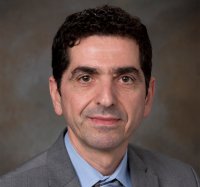 Associate
Professor of Medicine and Biomedical Informatics
Associate
Professor of Medicine and Biomedical Informatics
Medical
Oncology, Faculty
Department of Medicine
Yale School
of Medicine
Dr. Hatzis has over 20 years of experience in senior research and management roles in biocomputational techniques, systems biology modeling, genomic analysis and clinical diagnostics. He received his Ph.D. from the University of Minnesota and held several senior research roles in the biotechnology industry. He has been the cofounder of two startup companies specializing in bioinformatics tools development and in clinical diagnostics. He is currently in the faculty of Medical Oncology, Department of Medicine at the Yale School of Medicine. Dr. Hatzis had been an active member of the Biostatistics committee of FDA's Microarray QC program, co-investigator on the NCI Cancer Biospecimen Integrity program and co-investigator on serveral studies by Breast Cancer Foundations. Among his most significant contributions are the co-development with colleagues from MD Anderson of the RCB index, a continuous index of residual disease in breast cancer, and the development of a gene-expression based prognostic signature for patients treated with standard chemotherapy that accounts for phenotypic differences and integrates endocrine sensitivity, and chemotherapy response and resistance endpoints. Dr. Hatzis continues to be involved in the design of biomarker validation clinical studies and development of strategies for translating genomic diagnostic assays to clinical practice. His current research interests focus on developing methods to characterize the genetic and molecular heterogeneity of breast cancer subtypes and the implications it might have on response and resistance to treatment. A key area of interest is to develop methodology that integrates genomic level information of individual patients to lead to more focused treatment decisions tailored for the individual tumor. Dr. Hatzis is serving as academic editor on biomarker journals, has been a reviewer on NCI and NSF panes and is serving as ad-hoc reviewer on several bioinformatics and clinical journals.
 Fred Prior, Ph.D. is Professor and Inaugural
chair of the Department of Biomedical Informatics as the University of
Arkansas for
Medical Sciences (UAMS). Dr. Prior has over 30 years of R&D experience
in industry and academia, focused on the design of advanced medical information
management and imaging technologies. He has held senior management positions
in a variety of R&D environments ranging from Silicon Valley startups
to major multi-national corporations in the US and Europe. Dr. Prior’s
research interests include cancer informatics, radiomics, advanced imaging
technologies and big data analytics. He serves as principle
investigator and director of the US National Cancer Institute’s
Cancer Imaging Archive project. And is the lead PI of an NCI funded Quantitative
Imaging Network team developing tools for radiomic analysis. Dr. Prior
directs informatics efforts for the UAMS Translational Research Institute.
He is an associate editor of several leading information technology
journals, and a reviewer for numerous other scientific and engineering
journals as well as U.S. and European funding agencies. He is the author
of over 100 scientific.
Fred Prior, Ph.D. is Professor and Inaugural
chair of the Department of Biomedical Informatics as the University of
Arkansas for
Medical Sciences (UAMS). Dr. Prior has over 30 years of R&D experience
in industry and academia, focused on the design of advanced medical information
management and imaging technologies. He has held senior management positions
in a variety of R&D environments ranging from Silicon Valley startups
to major multi-national corporations in the US and Europe. Dr. Prior’s
research interests include cancer informatics, radiomics, advanced imaging
technologies and big data analytics. He serves as principle
investigator and director of the US National Cancer Institute’s
Cancer Imaging Archive project. And is the lead PI of an NCI funded Quantitative
Imaging Network team developing tools for radiomic analysis. Dr. Prior
directs informatics efforts for the UAMS Translational Research Institute.
He is an associate editor of several leading information technology
journals, and a reviewer for numerous other scientific and engineering
journals as well as U.S. and European funding agencies. He is the author
of over 100 scientific.  Dr. Daniel Johnson received all of his training at Arkansas
State University. He received a B.S. and a M.S. both in Computer Science
in 2005 and 2009
respectively, and a Ph.D. in Molecular Biosciences focused on Bioinformatics
in 2015.
Dr. Johnson joined the University of Tennessee Health Science Center
(UTHSC) in May 2015 as Director of Molecular Bioinformatics. The Molecular
Bioinformatics Core opened in July 2015 at UTHCS. The core was established
in order to assist and educate medical researchers in the proper analysis
and interpretation of molecular data, and its connection to improving
human health. He has collaborative research projects across the College
of Medicine, College of Pharmacy and Allied Health Professions. His talk
will discuss the building of the Molecular Bioinformatics Core, the pit
falls and potential of NGS in human health, and techniques for analyzing
NGS data.
Dr. Daniel Johnson received all of his training at Arkansas
State University. He received a B.S. and a M.S. both in Computer Science
in 2005 and 2009
respectively, and a Ph.D. in Molecular Biosciences focused on Bioinformatics
in 2015.
Dr. Johnson joined the University of Tennessee Health Science Center
(UTHSC) in May 2015 as Director of Molecular Bioinformatics. The Molecular
Bioinformatics Core opened in July 2015 at UTHCS. The core was established
in order to assist and educate medical researchers in the proper analysis
and interpretation of molecular data, and its connection to improving
human health. He has collaborative research projects across the College
of Medicine, College of Pharmacy and Allied Health Professions. His talk
will discuss the building of the Molecular Bioinformatics Core, the pit
falls and potential of NGS in human health, and techniques for analyzing
NGS data.
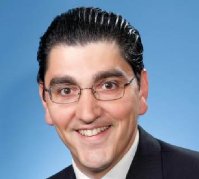 Dr.
Konstantinos Arnaoutakis is a hematologist and oncologist at the Winthrop
P. Rockefeller Cancer Institute at the
University of Arkansas
for Medical Sciences.
He is an Associate Professor of Medicine in the Department of Internal Medicine,
Division of Hematology and Oncology at the University of Arkansas for Medical
Sciences and associate program director of the Hematology/Oncology Fellowship.
He received his medical degree at the University of Patras, Greece. He
completed
his Internal Medicine residency at the Albany Medical Center in Albany, New York
and his Hematology and Oncology fellowship at Tufts University, St. Elizabeth’s
Medical Center in Boston, Massachusetts.
Dr.
Konstantinos Arnaoutakis is a hematologist and oncologist at the Winthrop
P. Rockefeller Cancer Institute at the
University of Arkansas
for Medical Sciences.
He is an Associate Professor of Medicine in the Department of Internal Medicine,
Division of Hematology and Oncology at the University of Arkansas for Medical
Sciences and associate program director of the Hematology/Oncology Fellowship.
He received his medical degree at the University of Patras, Greece. He
completed
his Internal Medicine residency at the Albany Medical Center in Albany, New York
and his Hematology and Oncology fellowship at Tufts University, St. Elizabeth’s
Medical Center in Boston, Massachusetts. Dr. Arnaoutakis specializes in the treatment of aerodigestive and genitourinary cancers. He is the coordinator of the Disease Oriented Committee for Lung Cancer Research in the Rockefeller Cancer Institute at the University of Arkansas for Medical Sciences. He is an active member of the SWOG cooperative group (formerly the Southwest Oncology Group), the American Society of Clinical Oncology (ASCO) and the International Association for the Study of Lung Cancer (IASLC).
 Research
Principal Investigator
Research
Principal Investigator
Division of Bioinformatics and Biostatistics
wenming.xiao@fda.hhs.gov
Dr. Xiao received his bachelor in biology from Xiamen University in 1989 and master in genetics from the Institute of Microbiology, Chinese Academy of Science in 1992. Later on, he moved to United States and finished Ph. D program in molecular genetics form the Medical College of Wisconsin in 1997 and master program in computer science from Marquette University in 1998. From 1998 to 2005, Dr. Xiao was bioinformatics scientist in GeneLogic, MetriGenix, and Celera Genomics. Since 2005, he joined the National Institute of Health as a contractor and then as a staff scientist at Center for Cancer Research, National Institute of Cancer. In Dec, 2014, Dr. Xiao joined Division of Bioinformatics and Biostatistics, National Center for Toxicological Research, Food and Drug Administration. Dr. Xiao has numerous publications in peer-reviewed journals such as Nature, PNAS, N. Engl. J. Med, and Cancer Cell. In 2010, he received the NIH director award and NIH merit award for his contribution in Lymphoma Leukemia Molecular Profiling Program. During his early career in industry, Dr. Xiao defined and developed IT infrastructure and software/database solutions for genomics and microarray data. His recent focus is to develop informatics tools in supporting next generation sequencing technology for intramural research at the NIH for various applications such as, genome assembly, ChIP-Seq, RNA-Seq, Exome-Seq and digital gene expression.
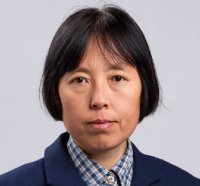 Dr.
Xiuzhen Huang is professor of Computer Science at Arkansas State University,
Jonesboro. She is also Graduate
Faculty of Molecular
Biosciences at the PhD Program of Arkansas State University, Graduate Faculty
of UALR/UAMS Joint PhD Program in Bioinformatics and Adjunct Faculty of
Information Science Department, University of Arkansas at Little Rock.
She did her B.S. and MS in Computer Science (with honor from Shandong University,
China she did her doctorate from Texas A&M University at College Station.
Dr.
Xiuzhen Huang is professor of Computer Science at Arkansas State University,
Jonesboro. She is also Graduate
Faculty of Molecular
Biosciences at the PhD Program of Arkansas State University, Graduate Faculty
of UALR/UAMS Joint PhD Program in Bioinformatics and Adjunct Faculty of
Information Science Department, University of Arkansas at Little Rock.
She did her B.S. and MS in Computer Science (with honor from Shandong University,
China she did her doctorate from Texas A&M University at College Station.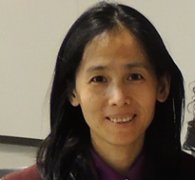 Mary
Yang, Ph.D. .
Mary
Yang, Ph.D. .
Associate Professor of Information Science
Director of the joint UALR/UAMS Bioinformatics Program
University of Arkansas at Little Rock
mqyang@ualr.edu
Mary Yang is an Associate Professor of Information Science at UALR and Director of the joint UALR/UAMS Bioinformatics Program. Mary Yang received the MS, MSECE and Ph.D. degrees from Purdue University and had postdoctoral training from NIH. She was the founding Editor-in-Chief of the International Journal of Computational Biology and Drug Design and is on the editorial board of the Journal of Supercomputing and the International Journal of Pattern Recognition and Artificial Intelligence. Dr. Yang's main research interest is to develop functional genomics and systems biology-based approaches to understanding the molecular mechanisms underlying complex diseases such as cancer.
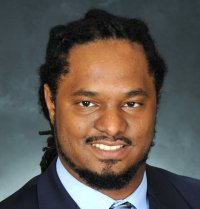 Dr.
Karl Walker serves as Assistant Professor in the Department of Mathematics
and Computer Science at UAPB. In this
capacity, he teaches
graduate and undergraduate courses in computer science, mathematics, and
bioinformatics. In addition, he engages in bioinformatics research at UAPB,
some of which is done in collaboration with other Arkansas institutions.
Dr. Walker has a persistent desire to investigate, learn, and share his
knowledge
with others. His bioinformatics research interests lie in
protein
structure prediction with emphasis on improving the accuracy of prediction.
Dr. Walker’s lab develops models and tools for analyzing structural
genomics and proteomics data. He has also collaborated on bioinformatics
research projects with researchers at ASU, UALR, UAMS, UAF, NCTR, and others.
He has published articles and delivered a number of presentations related
to his research. Dr. Walker earned both an MS and Ph.D. in bioinformatics
from the University of Arkansas at Little Rock (UALR) and the University
of Arkansas for Medical
Sciences (UAMS).
Dr.
Karl Walker serves as Assistant Professor in the Department of Mathematics
and Computer Science at UAPB. In this
capacity, he teaches
graduate and undergraduate courses in computer science, mathematics, and
bioinformatics. In addition, he engages in bioinformatics research at UAPB,
some of which is done in collaboration with other Arkansas institutions.
Dr. Walker has a persistent desire to investigate, learn, and share his
knowledge
with others. His bioinformatics research interests lie in
protein
structure prediction with emphasis on improving the accuracy of prediction.
Dr. Walker’s lab develops models and tools for analyzing structural
genomics and proteomics data. He has also collaborated on bioinformatics
research projects with researchers at ASU, UALR, UAMS, UAF, NCTR, and others.
He has published articles and delivered a number of presentations related
to his research. Dr. Walker earned both an MS and Ph.D. in bioinformatics
from the University of Arkansas at Little Rock (UALR) and the University
of Arkansas for Medical
Sciences (UAMS).